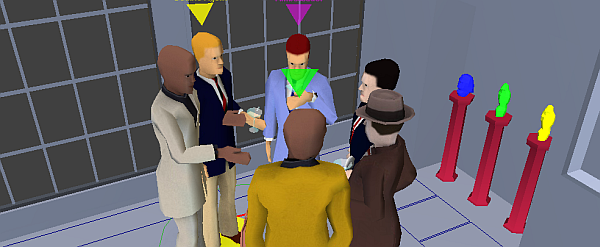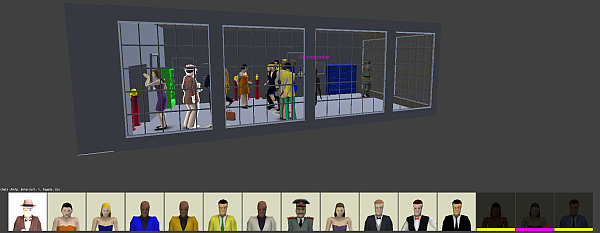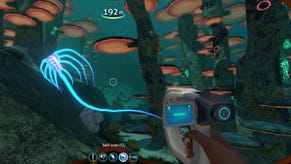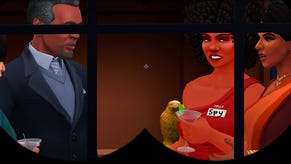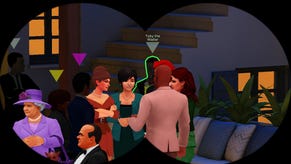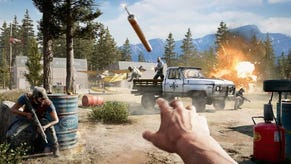Hands On: Spy Party
I Spy (Party)
If Spy Party developer Chris Hecker were to look back over the game's connection logs from the past year, he might notice some strange behaviour. He'd see me arriving, spending a minute in the lobby, then disconnecting. This pattern would be repeated a few times. It wasn't a technical problem, Chris. Don't go bug-hunting. Those cold digits spilling over your screen as you search for a flaw wouldn't have registered the truth of the situation: I am a coward. It was the panic I was feeling over becoming a Spy Party player that was causing me to leave.
Though it's ostensibly about sniping and spying, it's not really about those. It's about recognising the humanity in someone desperately attempting to hide it. I'm comfortable with learning game mechanics, but putting my understanding of humanity out there left me feeling uneasy. What if I never won a match? What would that say about me as a human being? This was a strange thing to bump up against, and I dealt with it by fleeing away from the established little community that the game had built up. But the recent paid-for open beta made me reconsider. New people? We'd be in a similar situation of fumbling about in Spy Party's psychologically driven multiplayer. We'd be equals! So I took the plunge.
It's a 1v1 asymmetrical multiplayer game where the sniper watches a party through his scope. He has one bullet to kill the spy, so has to be sure. The spy, meanwhile, is having a wonderful time: chatting to partygoers, cadging drinks, and admiring the decor. But he's also seducing people, moving bugs, and contacting double agents. His job is to blend into the gathering that the sniper is peering at, while secretly performing the tasks. Most of those have tells, like an animation being played or a sound file activating, though some are invisible and rely on pure deduction to uncover.
At first I found playing the spy unfathomably tense. The same odd, social panic I get at arriving at a party that's already in full swing (I don't know why, but I just shivered at the thought) settled over me as I watched my character wander the room. The game begins with the player's character under the computer's control, so it immediately presents you with a decision: when to take over? In the scheme of things it's one of the easier choices, but when I first did I felt like the clutzy and obvious human that I am. I couldn't imagine someone staring at the boxy level of the ballroom and not spotting the switchover. Anytime the sniper's laser beam played over me, I was sure the bullet would land and I'd be unmasked. And when it wasn't there, I was sure I was being toyed with before a shot took me out. But it didn't happen, and I'll get to why in a few paragraphs.
Spy Party is a clunky game by design. The spy has to blend into the Brownian motion of party, moving with the same stodgy movement to mimic the AI. Just acting like an NPC requires determination: the best method is to make the decision of where you want to go before you move, either to a task area or to just talk to other partygoers, and then move with authority. Fiddling with your position when you get there is a big tell. Don't aspire to perfection, as it's a dead giveaway. I've died a few times because I fiddled with my position. The AI will mess up where they stand, but won't worry about fixing it.
The more telling tells happen during the missions. At the start of the game, the spy selects a number of tasks to perform: I'm partial to the statue swap, but I hate bugging the ambassador; statue inspection can be done with no apparent tells, but it also takes time to do. Each mission can be performed with varying levels of competence via action tests, which require a steady mouse finger to stop a slider. Flub it while you're attempting swap a statue and the statue will flicker through a number of choices before fixing on one. Get the sweeping slider in the white zone and the spy will instantly swap the statue. Now you're probably imagining yourself as the sniper, camping out over the statues and waiting for one to swap. But if you manage to nail the green swap, stopping the slider in the tiny band of green pixels, the spy won't even swap the statue. An NPC will. A cunning ruse, and one that will seriously mess up most snipers, though smarter players might notice that the statue was swapped instantly by the NPC. Even the tells have tells.
When you remember you're playing with human intuition, there are things you can do to manipulate it. My finest attempt came when I noticed the sniper's laser beam was fixated on a particular NPC. For whatever reason he wasn't being subtle about his choice. While the spy can see the sniper's laser beam moving across the level, the sniper has a wide-angle view of the entire room. It's conceivable that the laser sight could be on one part of the room while the sniper is watching another part of it, but in this instance I was fairly confident he'd made a selection.
From the sniper's view, he could see a pair of suspected double agents milling about. The audible "Banana Bread" is spoken when contact is made, but it's also spoken as a decoy. I got lucky in the NPC's wanderings: he stood in one of the room's designated chat areas with a double agent. I was across the room in another conversation and tried the decoy. Two seconds later the NPC's head jerked back and a winner was me. Hooray for me! That said, I can't even take credit for the move. It's already a known tactic.
I felt well clever, though it was mostly due to the other player's lack of playtime than any particular skill on my part. However I wasn't about to feel smug, because I found sniping terrifying. The spy only really has a few defining decisions to make, but the sniper has to parse the movement of a player out of a sea of movement. If I haven't made some sense of what's going on after 20 seconds, I start to worry. It already feels like I've lost. The first few seconds playing as the sniper is just utter confusion, and it's laughable that I was worried about being instantly outed.
There are things you can do to help: high and low-lighting (with the left and right mouse buttons) will let you darken or lighten characters. It's a handy power to have, and I use it to low-light (darken) all the obvious NPCs (the suspected double agents, the ambassador). It's a calming ritual, taking the first few seconds to make a quick round of the NPCs and the statues. I do it to make them easily identifiable, but I also need to do it so I can relax and begin hunting the human.
That hunting is often instinctual, though I'd imagine eventually becomes something more of a skill with time. I'm not there, yet. I'll see a character move a certain way that my brain doesn't like, but it's a struggle to tell you exactly what it was they did. A sudden jerk that just feels wrong. Gut instinct is a pretty powerful tool for a beginner sniper, and it's worth going with it. Though the first time you take the safety off the gun and shoot the wrong NPC, you'll realise you need to back it up with some serious deduction.
Because you are being fucked with. Constantly. Always. By the game, by the other players, and by your brain. The way I play Spy Party is to assume that everyone is amazing, and that I need to be vigilant at all times. That way I'm unlikely to miss an obvious error, like the player coughing when he messes up contacting the Double Agent, or I might be lucky to catch a subtle tell from a good player. Even if my view is pulled out all the way back, it's possible to spot a statue flicker and change from Indiana Jones's golden idol to the Maltese Falcon.
A lot goes into the sniper's single bullet. This is how I remember one round taking place: Why is he going there... was that a flinch... pull back, look at the whole room... right, the statues are all arranged from big to little on that side, and they're all the same on the other side... someone's at the bookca- ah, it's the ambassador... WHO SAID "BANANA BREAD" I WILL SHOOT YOU IN... damnit, a statue has been swapped... okay, keep an eye on the books, but low-light anyone at the statues from now on... that lady at the bookcase was the one who flinched earlier, I'll highlight her... the man with the hat checked his watch at the window but the time didn't change, so I'll low-light him... another "Banana Bread", and the high-lighted lady is in a circle with a double agent... I'll keep her in the corner of my view and float the laser beam over to the other side of the room... that guy in the checked suit has spent a while at the book-case, but he's also low-lighted... I'll follow him while keeping her in- AHA THAT WAS A TELL, SHE TOTALLY MOVED HER HEAD... am you sure, Craig... I'm sure, me... take the shot... take the shot... take it...
I took the shot.
At that point there's another realisation. This is a game that's entirely uninterested in the mechanics of sniping. It's just a framework for the end of the decision-making process. You don't need to be a good shot. Just an observant human being, capable of recognising patterns that matter while discarding others. It's scary, but a positive result is oddly affirming.
Just as I was finishing writing this up, I popped into take a few screenshots and found myself in a match with a player with hundreds more games than I've played. He took a minute to suss me out, killed me, then he explained in detail how he did it. I discovered it was because my mission choice let him know that I had to swap the statues. All he needed to do was camp them. There are tells everywhere.
Chatting is a big part of Spy Party's charm. The lobby encourages people to hang out, so it's a place for general game chat as well as a game picker. Everyone's win-loss record is displayed, so you know just what you're getting into when someone with a higher number of games plays you. But it's something that helps, because this is a game of depth, and better players need good players to keep it interesting. They'll often mentor newbies. It's through the small community that I started to learn a few non-obvious tells, which is funny given how much they scared me to begin with.
But more than that, it's also nice to hear just how tense the game is for other players. Everyone seems to collapse into a babbling heap at the end of a match, willing to spill out all their anxieties and failings about how they played. So far I've not had a single passive-aggressive "GG", or a rage-quitter. We just talk about the rights and wrongs, and often with a sense of relief. For that reason alone it's a remarkable thing.


